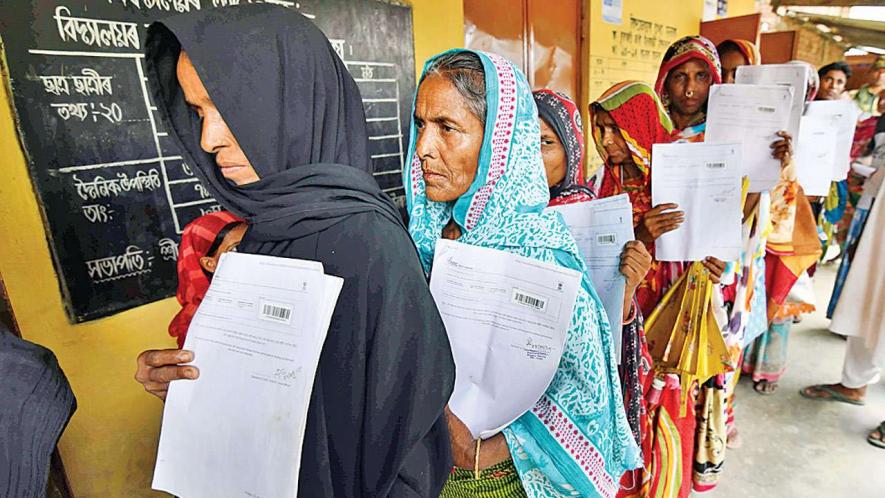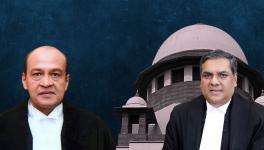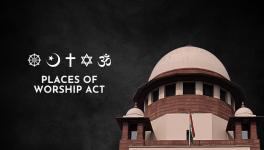A Backdoor Push for the Citizenship Amendment Bill in Assam?

Image for representational use only; Image Courtesy : DNA India
Though for a large part of 2018, Assam had been in the grip of periodic agitation against the Citizenship (Amendment) Bill, not many knew that a backdoor had been created by amending the Passport (Entry into India) Rules and the Foreigners Order in 2015. Since Rules fall within the domain of subordinate legislation, they tend to be the domain of bureaucrats rather than Parliament. Hence, these seemingly innocuous changes went unnoticed by almost everyone. On December 21 this year, a petition was filed in the Supreme Court by Dr. Hiren Gohain and Harekrishna Deka’s Nagarikatwa Aain Songsudhan Birodhi Mancha (Forum Against Citizenship Amendment Bill) against the 2015 amendments. Both Dr. Gohain and Deka are office bearers in the organisation.
NewsClick spoke to Dr. Gohain who said that in his opinion, the government had acted on the sly. It was only after the Citizenship (Amendment) Bill was introduced that there was an awareness that the Rules had been amended.
Also See | Citizenship (Amendment) Bill Will Destroy the Constitution: Suprakash Talukdar, CPI(M)
Passport Rules Amendments
On September 7, 2015, the Passport (Entry into India) Rules,1950, and the Foreigners Order, 1948 were amended. The amendment to the Passport Rules was to insert clause (ha) in Rule 4(1). Rule 4 exempts certain classes of persons from possessing a valid passport for entering into India. Clause (ha) has added the following;
“persons belonging to minority communities in [Afghanistan, Bangladesh] and Pakistan, namely, Hindus, Sikhs, Buddhists, Jains, Parsis and Christians who were compelled to seek shelter in India due to religious persecution or fear of religious persecution and entered into India on or before the 31st December, 2014-
(i) without valid documents including passport or other travel documents; or
(ii) with valid documents including passport or other travel document and the validity of any of such documents has expired: Provided that provision of this clause shall take effect from the date of publication of this notification in the Official Gazette.]”
Also Read | Will Assam Burn While BJP Fiddles With the Citizenship Bill?
Changes in the Foreigners Order
The Foreigners Order had been amended by inserting paragraph 3A which states;
“(1) Persons belonging to minority communities in [Afghanistan, Bangladesh] and Pakistan, namely, Hindus, Sikhs, Buddhists, Jains, Parsis and Christians who were compelled to seek shelter in India due to religious persecution or fear of religious persecution and entered into India on or before the 31st December, 2014-
(a) without valid documents including passport or other travel documents and who have been exempted under rule 4 from the provisions of rule 3 of the Passport (Entry into India) Rules, 1950, made under section 3 of the Passport (Entry into India) Act, 1920 (34 of 1920); or
(b) with valid documents including passport or other travel document and the validity of any of such documents has expired,
are hereby granted exemption from the application of provisions of the Foreigners Act, 1946 and the orders made thereunder in respect of their stay in India without such documents or after the expiry of those documents, as the case may be, from the date of publication of this order in the Official Gazette.]”
Also Read | The Citizenship Bill and the Resurgence of the Rising Sun
The petition has sought for the impugned amendments to be struck down on the grounds that they are discriminatory and arbitrary. They have also prayed that the Government of India constitute a National Immigration Commission or other appropriate body to frame a National Immigration Policy and a National Refugee Policy. Another prayer was that the Government of India should be directed to take effective steps towards preserving the distinct culture, heritage and traditions of the indigenous people of Assam in furtherance of Clause 6 of the Assam Accord as well as the international commitments India has accepted. Hence, the petitioners have challenged these amendments and orders on three grounds; secularism, executive overreach and indigenous rights.
Secularism
The Citizenship Amendment Bill which seeks to relax the citizenship laws for undocumented migrants from Afghanistan, Bangladesh and Pakistan who are Hindus, Sikhs, Buddhists, Jains, Parsis and Christians have been criticised for violating secularism. The amendments to the Rules also violate secularism. This is due to their emphasis on religion to be a decisive factor in determining citizenship as well as who qualifies to be an illegal migrant. Section 2(b) of the Citizenship Act defines an illegal migrant as one who has entered India without valid documents or one who has overstayed the period for which their entry was permitted. The question of the person’s religion does not arise.
Also Read | Is Assam being Polarised on the Citizenship Bill Issue?
The petition has alleged that this is the first time in India that religion has become a principle in citizenship law. Thus, the petitioners have called the amendments ‘communally motivated humanitarianism’. Similarly, though religious persecution is a valid ground for granting asylum, articulating this humanitarian objective solely on the basis of a few religions “dilutes the republican and secular foundations of citizenship in India”.
Executive Overreach
The petitioners alleged that the effect of the amendments was akin to amending the definition of illegal migrant under section 2(b) of the Citizenship Act without first amending the Act. This is not correct in law, as the Rules being subordinate legislation cannot contradict existing Acts.
“It is almost like putting the cart before the horse,” Dr. Gohain told NewsClick, referring to the act of changing the rules before amending the Act.
Another issue with the amendments pointed out in the petition is that by virtue of Article 11 of the Constitution, Parliament alone has the authority to make laws on acquisition and termination of citizenship.
Also Read | The Conflicting Views on Minority Status in Assam
Indigenous Rights
The petition laid a heavy emphasis on the United Nations Declaration on the Rights of Indigenous Peoples (UNDRIP) to which India is a signatory as well as the Assam Accord.
The UNDRIP was adopted by the United Nations General Assembly on September 13, 2007. Article 8 prohibits the states from forcefully assimilating or destroying the culture of indigenous peoples. This provision also mentions forced population transfers as means of forced assimilation. The UNDRIP has enumerated a list of actions that the signatory states are prohibited from undertaking with respect to the indigenous peoples.
The term ‘indigenous peoples’ has been defined in several international documents. Under the International Labour Organisation’s Convention 169 – to which India is a signatory –, indigenous people must firstly self-identify as belonging to an indigenous group. They must also be the descendants of populations who inhabited the country or geographical region at the time of conquest, colonisation or the establishment of the present state boundaries. They must also retain some or all of their own social, economic, cultural and political institutions irrespective of their legal status.
Also Read | The Citizenship Amendment Bill, Assam Accord and the People of Assam
Clause 6 of the Assam Accord states, “Constitutional, legislative and administrative safeguards, as may be appropriate shall be provided to protect, preserve and promote the culture, social, linguistic identity and heritage of the Assamese people.” The Assam Accord came into being in 1985 after half a decade of unrest and agitations in the state. The Accord had declared March 24, 1971, to be the cut-off year for determining citizenship in Assam alone. The 2015 amendments fly in the face of this promise.
The petitioners have pointed out that migration has been an issue in Assam which has led to ethnic unrest. They have also pointed out Assam’s diminishing forest cover and the high population of border districts as being illustrative of the undocumented migration from Bangladesh. From this perspective, the petitioners allege that the amendments will encourage further undocumented migrants to enter Assam to the detriment of not only the rights of the Assamese people, but also the law and order situation in the state.
Get the latest reports & analysis with people's perspective on Protests, movements & deep analytical videos, discussions of the current affairs in your Telegram app. Subscribe to NewsClick's Telegram channel & get Real-Time updates on stories, as they get published on our website.
























